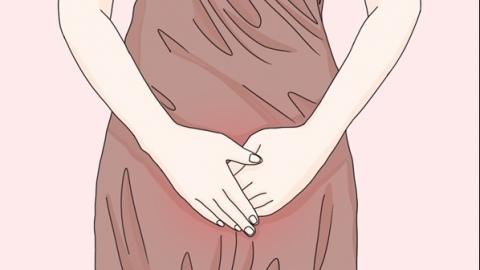What causes a delayed menstrual period?
Menstruation refers to the menstrual cycle. Delayed menstruation may be caused by excessive mental stress, extreme dieting, polycystic ovary syndrome (PCOS), premature ovarian insufficiency, endometritis, and other factors. Management should be based on individual situations. It is recommended to visit a hospital promptly and follow medical advice for treatment.

1. Excessive Mental Stress: Long-term mental tension and a persistently stressed cerebral cortex can inhibit gonadotropin release, leading to delayed menstruation, often accompanied by anxiety, insomnia, and other symptoms. Improvement methods include relieving stress through exercise, meditation, traveling, maintaining a cheerful mood, and following a regular routine to allow the body's endocrine system to return to normal.
2. Excessive Dieting: Dieting severely restricts nutrient intake and causes a sharp decline in fat reserves, affecting estrogen synthesis and subsequently delaying menstruation. Symptoms may include weight loss and worsening skin condition. It is recommended to resume normal eating habits, ensure balanced nutrition, and consume more foods rich in protein, fats, and vitamins to provide sufficient nutritional support for the menstrual cycle.
3. Polycystic Ovary Syndrome: Endocrine and metabolic abnormalities may lead to the development of multiple small follicles in the ovaries that struggle to mature and ovulate, causing prolonged menstrual cycles, reduced menstrual flow, or even amenorrhea. Symptoms may also include hirsutism and obesity. Patients can follow a doctor's guidance to use medications such as letrozole tablets, bromocriptine mesylate tablets, and spironolactone tablets to regulate endocrine function.
4. Premature Ovarian Insufficiency: Autoimmune abnormalities, genetic factors, and others may cause premature ovarian decline, reducing estrogen secretion and resulting in irregular or delayed menstruation. Common symptoms include hot flashes, night sweats, and insomnia due to low estrogen levels. It is recommended to follow medical instructions to use estradiol valerate tablets, progesterone capsules, Kuntai capsules, and other medications to supplement estrogen and alleviate symptoms.
5. Endometritis: Infection of the endometrium by pathogens causes inflammation, which may affect normal endometrial proliferation and shedding, leading to delayed menstruation, accompanied by lower abdominal pain, abnormal vaginal discharge, fever, and other symptoms. Patients can follow medical advice to use medications such as cefixime capsules, metronidazole tablets, and Fuke Qianjin tablets to control inflammation.
Women should take care of their bodies during menstruation, avoiding spicy and cold irritants such as chili peppers and ice cream. A balanced diet is also important to avoid relying on single-source foods.
References:
[1] Liu Xiaohong, Zhang Yang. "The effect of Fuke Qianjin tablets as an adjunct to ceftriaxone sodium and metronidazole injection on the treatment of endometritis and menstrual recovery." Northern Pharmacology Journal, 2021, 18(02): 84-85.
[2] Tian Sainan, Tang Li, Wang Shengyu, et al. "Research on the development of traditional Chinese medicine in treating premature ovarian insufficiency." China Journal of Chinese Materia Medica, 1-15 [2025-03-18]. https://doi.org/10.19540/j.cnki.cjcmm.20250228.501.




